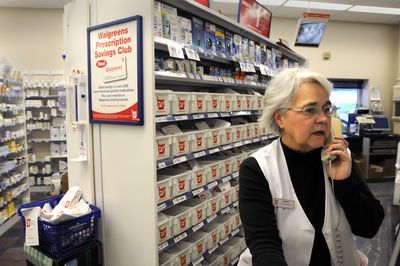Lawsuit prompts delay in Medicaid rate cuts
Pharmacies balk at state’s plan to reduce payments

A federal judge has temporarily blocked Washington state’s plan to reduce how much it pays for brand-name drugs prescribed to Medicaid patients.
The state hopes to achieve $109 million in savings by steering pharmacies toward cheaper generic drugs. To encourage that shift, Gov. Chris Gregoire’s proposed budget would pay less for brand-name drugs, as would the Senate’s budget.
Pharmacies cried foul over the price cut and sued, arguing that the state ignored the negative effect such rate cuts would impose beginning today.
U.S. District Judge Robert Bryan granted a temporary restraining order and scheduled a hearing on the matter for April 9.
Walgreen Co., the state’s largest medication retailer, announced that 44 of its pharmacies would withdraw from the program and quit filling Medicaid prescriptions by May 1 if the price cuts take hold. Four Spokane County stores would be affected: 12 E. Empire Ave., Spokane; 1708 W. Northwest Blvd., Spokane; 2105 E. Wellesley Ave., Spokane; and 12312 E. Sprague Ave., Spokane Valley.
“We would take a loss on every name-brand prescription that we fill,” said Walgreens spokeswoman Tiffani Washington. “We won’t accept that. So at this point, that’s the decision.”
Walgreens – which operates 6,679 drugstores in 49 states – claims that Washington already has the lowest Medicaid reimbursement rates for brand-name drugs.
The lawsuit was filed by the Washington State Pharmacy Association, the National Association of Chain Drug Stores, and the National Community Pharmacists Association.
The organizations estimate that the state’s cuts would erode medical services as pharmacies quit participating in Medicaid – a government program that uses a blend of federal and state tax dollars to subsidize health care costs for poor people.
Doug Porter, an assistant secretary for the Department of Social and Health Services, said the state will review a range of options that includes arguing its case for a 20 percent cut; abandoning the cuts; or attempting to either settle or argue for a less severe cut.
DSHS has said its plans to scale back Medicaid reimbursements would save taxpayers about $109 million over the next two years by taking advantage of the same rules that the private health industry uses to control its costs.
One goal is to bring generic drug fill rates to 80 percent in the state. Currently the generic fill rate is 63 percent.
“Currently, Medicaid actually pays more than many private payers for higher priced drugs in the pharmacy marketplace. That simply isn’t acceptable for a taxpayer-funded program in these times,” Porter said last week when the state announced its plans.
“The filing of this lawsuit was necessary because this is no time to be poking holes in the Medicaid safety net,” said Holly Henry, a Seattle pharmacy owner and the president of the NCPA.
“Community pharmacies aren’t getting rich off Medicaid. They’re just trying to serve the needs of all their patients.”